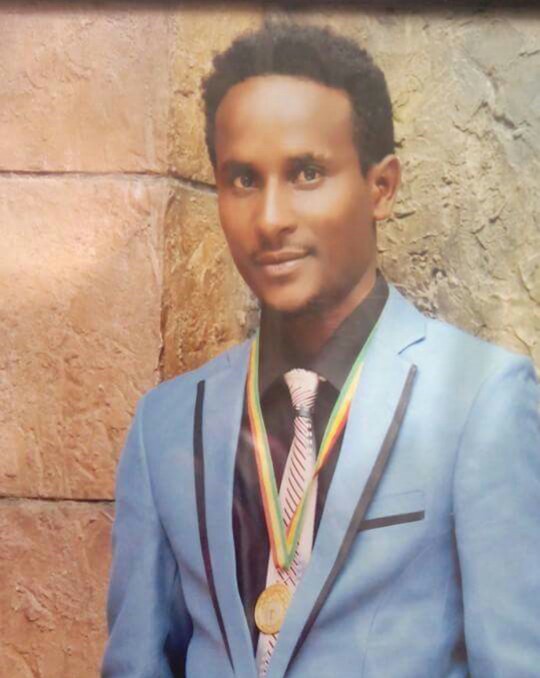The Untapped Potentials of Youths as Agents of Sustainable Peace in Ethiopia
27. January 2019 at 09:01
Youths have been erroneously perceived as agents of violent conflicts, instability, chaos and insecurity since ancient epochs. Such pessimist views attributed for the less participation of youths in the peace building process of nations. Predominantly, the problem is ubiquitous in Africa and Middle East regions of the globe.
 African youths has so far been perceived as agents of political turmoil and violent conflicts. Such perceptions compel youths to revolt against governments and they expedite the removal of dictators from power. The Arab uprising praised as best example in this regard. It was a trans-formative instant for the youths who have purposefully been excluded from government affairs. Young women and young men have a critical role in promoting and maintaining international peace and security. Contrary to most popular representations, the majority of youth are not violent. Rather, they can and do play active roles as agents of positive and constructive change. Ethiopia could not escape from such realities. Youths were and still are denied from active and meaningful participation of government affairs. Decisions, which may have an ultimate impact on youths, are made in the exclusion of youths. Hence, this paper explores the linkage of youths to peace; challenges moored towards youths in discharge of their role in sustainable peace; approaches to be followed to create enabling environment and realties and status of youths towards sustainable peace in Ethiopia. The paper opines that the potentials of youths towards sustainable peace in Ethiopia are untapped and underutilized. Meagerness of enabling environments are the contributing factors for the untapped and underutilized status of youths. Without enabling environments youth forces will remain stumbling blocks to sustainable peace and democratization than being building blocks.
African youths has so far been perceived as agents of political turmoil and violent conflicts. Such perceptions compel youths to revolt against governments and they expedite the removal of dictators from power. The Arab uprising praised as best example in this regard. It was a trans-formative instant for the youths who have purposefully been excluded from government affairs. Young women and young men have a critical role in promoting and maintaining international peace and security. Contrary to most popular representations, the majority of youth are not violent. Rather, they can and do play active roles as agents of positive and constructive change. Ethiopia could not escape from such realities. Youths were and still are denied from active and meaningful participation of government affairs. Decisions, which may have an ultimate impact on youths, are made in the exclusion of youths. Hence, this paper explores the linkage of youths to peace; challenges moored towards youths in discharge of their role in sustainable peace; approaches to be followed to create enabling environment and realties and status of youths towards sustainable peace in Ethiopia. The paper opines that the potentials of youths towards sustainable peace in Ethiopia are untapped and underutilized. Meagerness of enabling environments are the contributing factors for the untapped and underutilized status of youths. Without enabling environments youth forces will remain stumbling blocks to sustainable peace and democratization than being building blocks.Youths constitute the significant portion of the global population. Their role in the global leadership, however, is unmatched to their numeric proportion. They were/are excluded from active and meaningful participation in political, social and economic activities of governments. Their exclusion have drugged them to take part in violent conflicts. Adult, if not old, leaders who assumed government power exacerbate the conflict in tagging the youth force as ‘youth bulge’ who are destructive to the nation. Such political tagging’s changed the situations of youths bad to worse. Government’s inimical approach towards youths pushed youth forces to join radical, extremist and terrorist groups.
In recent times, however, the perception at the global level seems changed. Attaining sustainable peace at national and international level becomes impossible without the inclusion of youths who are a significant portion of the population. Peace-building and the making of sustainable peace require the participation of youths. Such needs trigger the United Nations Security Council to pass a resolution which urges member states to increase representation of youth in decision making at all levels and to consider setting up mechanisms that would enable young people to participate meaningfully in peace processes and dispute resolutions.
Hence, as part of the change in the perception, legal and policy guidelines are adopted at the global and regional levels to expedite youth’s participation in peace building and sustainable peace. The UNSC resolution (2250/2015); UNGA’s World Programme of Action for Youth (WPAY); the 2030 SDGs; Guiding Principles on Young People’s Participation in Peace-building crafted by the UN-Inter Agency Network on Youth Development and the 2006 African Youth Charter are some of the legal documents which regulate youths participation in peace-building and sustainable peace.
Despite the changes noted in the perception and legislative measures the youth force remain untapped and underutilized in sustainable peace and associated areas. Law would ever remain a mere rhetoric if it denied pragmatic application.” Ethiopian youths are not well utilized in this regard.
This paper examines the narratives towards youths and peace; the enabling environments for youths to play their role in sustainable peace; the realities in Ethiopia and the way forwards. Triangulation research methodology is being employed to answer the general research question that “Whether or not Ethiopia properly utilizes its youthful population for achieving sustainable peace.”
Youths as Agents of Peace: A counter Narrative
Youths as agents of peace is a recent understanding which presents as a counter narrative to the long-lived narrative which perceived youths as agents and drivers of conflicts, instability and turmoil. Now shifts in paradigm are witnessed. A shift from perceiving youths as perpetrators and/or victims of violence to peace builders and leaders in the transition periods and a shift from the maxim of ‘future leaders’ to ‘today’s leaders.’ Previously youths were pigeonholed as troublemakers and rebellious and they were left out of important activities because they were perceived as too young to understand. Now a shift from adult dominance on global issues to youth inclusiveness is observed.
Challenges for Youths to serve as Agents of Sustainable Peace
Youths significantly impact the stability of a nation. Economic, social and political exclusion of youths would lead to disruption and instability of a given nation. To preserve a long lasting peace within a nation youths shall be given a stake in their societies. But there are challenges for youths which hinders them to play their significant role in this regard. These Challenges are:
Unemployment; Illiteracy; lack of meaningful political participation; limited exposure for different entertainments; unwise utilization of social media; human right violations of youths in general; Exclusions of youths from economic; social and political participations; Pessimistic perceptions towards youths and their role; presence of Radicalism, extremist and terrorist groups/entities; and Lack of legislative and policy frameworks to address youths problems. These youth driven conflicts and instabilities would put the nation in fragility and participating youths would remain victims.
In Ethiopia these challenges are serious and prevalent. Mainly, illiteracy , unemployment, substance abuse, exclusion from political and economic spectrums of the country, and illness are omnipresent. Youths are highly affected in these problems. These problems incapacitate youths from playing their respective and anticipated roles in sustainable peace.
Enabling Environments and Approaches
Enabling environments are needed for youths to contribute their part to the sustainable peace of their country and the globe as well. Conducive political environ would facilitate and ease youths agency for sustainable peace. Creation of enabling environments can be taken place on the basis of different approaches. Human Rights based approach, economic approach, socio-political approach, and socio-cultural approach are the approaches to be used for the creation of enabling environments.
Using the Human Rights approach countries may create enabling environment for youth’s participation in sustainable peace through the protection and fulfillment of human rights as provided in various human right instruments. An economic approach identifies young people as central to the economic development of their country, and promote their access to economic opportunities as essential for their own development. Reduction of unemployment is at the heart of this approach. Socio-political approach connects young people to civil society and the political arena, and provides them with opportunities, training and support for their active engagement and participation in public life.
Realities in Ethiopia: Agents of the existing political reform?
Demographically 70-71% of the total population of Ethiopia is under the age of 30. 28% of the total population is between the ages of 15- 29. This youthful population is an incredible asset and untapped resource for positive growth to the country, if managed properly.
The inattention given to youths in Ethiopia has been prevalent since the earlier periods. Youths used to be detractors against governments in power. There was no a political space which accommodates youths and nor the opportunity for them to play leadership role. Since the ancient epochs Ethiopia has been ruled through old guards. That political culture is upheld this days too.
Reviewing the status of youths in the contemporary Ethiopia, there are efforts in taking legal and policy measures. Ethiopia has ratified the African Youth Charter. The charter envisages ranges of rights for youths. the right to not discriminate; freedom of movement; freedom of expression; freedom of association and peaceful assembly; Freedom of Thought, Conscience and Religion; Protection of Private Life; Protection of the Family; Right to own property; right to development(right to social, economic, political and cultural development) and Youth participation.
To these ends, state parties are obliged to develop a comprehensive and coherent national youth policy. On the basis of the Charter, Ethiopia adopted its National Youth Policy in 2004. The policy aims “to bring about the active participation of youth in the building of a democratic system and good governance as well as in the economic, social and cultural activities […] and to enable them to fairly benefit from the results.” It envisions youth as “a young generation with democratic outlook and ideals, equipped with knowledge and professional skills.” A wide range of priority areas of action are identified, including democracy and good governance, health, education and training, as well as culture, sport and entertainment.
The problem however is still persistent in the presence of the national youth policy. There may be two reasons for the unchanged status of youths even the presence of the policy. One reason is, youths were not part of the formulation process of the policy so that the policy was the outcome of aged political elites. Unless youth policies are formulated in line with the conditions set forth in the African Youth Charter and other international policy guidelines, policies will remain unhelpful for youth problem.
Youth policy should be cross-sectoral in nature considering the inter-relatedness of the challenges facing youths. It shall be informed by extensive consultation with young people and cater for their active participation in decision-making at all levels of governance in issues concerning youth and society as a whole; it shall integrate and mainstream youth perspectives within it; it shall be adopted by parliament and enacted into law. All these requirements are lacking behind the Ethiopian National Youth Policy. The other reason is there was no political determination to resolve all the problems facing by youths. Policies were issued only for the political consumption with no effect on the ground.
Had the government been so determined youths it would have resolve the pervasive problems that encounters the youths. Youths were lagged behind employment, leadership, decision making and proper representation at their government. Letting youths to fall behind the political, social and economic spectrums trigger youths to act violently and their multiple potential contributions are underutilized.
Ethiopian youths have faced the brutality of the EPRDF regime basically post 2005 election when a political transition and democratization have been aborted. Since then, killings, tortured, arbitrary arrest and gross human right violations against youths become the governing norm.
The regime invests a lot to incapacitate the youth from making an impactful opposition against the ruling party. Such tireless efforts could not protect the regime from being shrinking. The Oromo and Amhara youths furious opposition sparked since the 2015 cause the recent political reform. The reform is at its inception period with a forwarding potential. But for the realization of the ultimate objective of the reform, creating a democratized Ethiopia, active and meaningful participation of youths is a must. The reform does not hit its target without youth’s participation.
Making youths as owners and vanguards of the reform is not something to be waited for tomorrow, it is a must to done project of today. Given to their numerical composition [70-71% of the Ethiopian Population], the youths deserve utmost legal and institutional protection to realize their needs. Their needs are their causes that compel them to fight the old EPRDF regime. Justice, Human Rights, Constitutionalism, and Democracy were their main causes for their struggle.
By addressing youth’s problems the government which by now is in reform may use the youth’s untapped potential in achieving sustainable peace. Youths were agents of change and they will remain agents of more change a head of times if their problems are well addressed by the government. The failure to give due attention for youths would certainly abrupt the ongoing reform. Mob justice trends are signals for the unmanaged youth bulge.
Assigning young peoples to the highest political positions however is not a panacea for youth problems. Designing strategies for the resolutions of the problems at their root causes will rather be the panacea. This is not yet done. If an even political environment is adjusted for the youths, Ethiopia's youth has the potential to play a significant role in the country’s socio-economic and political development.
Broadening Youths Role : The unfinished Business
Making and enabling youths as leaders of their country is not an easy task. It demands real determination and patriotic heart. If current leaders are worried about the fate of their country in the near future they would work for the young generation to be the owner of its country. Real leaders accept the potentials of youths to lead. They also recognize the role of youths in the attainment of sustainable peace and democratization. Using the statement of the UNDP, “It is increasingly evident that tackling the challenges faced by young people by supporting their empowerment and providing them with an enabling environment for their human development makes today a potentially historic and transformational opportunity to lay the foundation for a peaceful and sustainable future.”
Seeing youths in the vital positions of decision making including the parliament and ministerial offices; getting youths in different government advisory bodies; looking youths in different human rights institutions and having youths who advocate for the rights of the disadvantaged groups could not be achieved without hope and hardworking. Every stakeholder must be involved in the unfinished business of broadening youth’s role.
Concluding Remarks & the Way Forward
There are many barriers that hinder youth’s active participation in socio-economic, political and cultural life. Such barriers restrain youths from contributing their role in the peace-building and sustainable peace of the country. Most youth have limited awareness of youth policies and there is little evidence that young Ethiopians are involved in the decision-making processes and the livelihoods of their communities. Moreover, participation in volunteering programs and use of youth center services is still limited, especially for young women.
Hence, youth force is untapped and underutilized for sustainable peace in Ethiopia. To utilize this untapped force the following points are recommended as a way forward.
The National Youth Policy should be revised to respond for current needs of the youths.
Youth policy should transformed into law so as to meet the needs of the youths and to exploit their potential in proper way. As policies are less in their force than laws, youth issues will not settled by mere policies unless backed up by strong legislative actions.
Government should assist youth lead and youth oriented organizations. Youths should establish such types of organizations tasked with varieties of youth agendas.
Peace education/studies must be incorporated in the curricula
Youths should experience leadership roles in the their earlier ages
Youths should rewrite the political culture established by the “ the generation of the 1960’s”
Comprehensive Sustainable Peace Policy vis-à-vis Youth’s Role towards sustainable peace is needed.
Cite This Article As: Dejen Yemane Messele . "The Untapped Potentials of Youths as Agents of Sustainable Peace in Ethiopia." International Youth Journal, 27. January 2019.
Link To Article: https://youth-journal.org/the-untapped-potentials-of-youths-as-agents-of-sustainable-p





Link To Article: https://youth-journal.org/the-untapped-potentials-of-youths-as-agents-of-sustainable-p
















